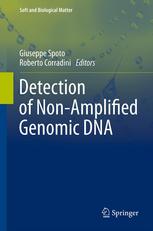

Most ebook files are in PDF format, so you can easily read them using various software such as Foxit Reader or directly on the Google Chrome browser.
Some ebook files are released by publishers in other formats such as .awz, .mobi, .epub, .fb2, etc. You may need to install specific software to read these formats on mobile/PC, such as Calibre.
Please read the tutorial at this link: https://ebookbell.com/faq
We offer FREE conversion to the popular formats you request; however, this may take some time. Therefore, right after payment, please email us, and we will try to provide the service as quickly as possible.
For some exceptional file formats or broken links (if any), please refrain from opening any disputes. Instead, email us first, and we will try to assist within a maximum of 6 hours.
EbookBell Team

5.0
110 reviewsThis book offers an overview of state-of-the-art in non amplified DNA detection methods and provides chemists, biochemists, biotechnologists and material scientists with an introduction to these methods. In fact all these fields have dedicated resources to the problem of nucleic acid detection, each contributing with their own specific methods and concepts. This book will explain the basic principles of the different non amplified DNA detection methods available, highlighting their respective advantages and limitations. Non-amplified DNA detection can be achieved by adopting different techniques. Such techniques have allowed the commercialization of innovative platforms for DNA detection that are expected to break into the DNA diagnostics market. The enhanced sensitivity required for the detection of non amplified genomic DNA has prompted new strategies that can achieve ultrasensitivity by combining specific materials with specific detection tools. Advanced materials play multiple roles in ultrasensitive detection. Optical and electrochemical detection tools are among the most widely investigated to analyze non amplified nucleic acids. Biosensors based on piezoelectric crystal have been also used to detect unamplified genomic DNA. The main scientific topics related to DNA diagnostics are discussed by an outstanding set of authors with proven experience in this field.